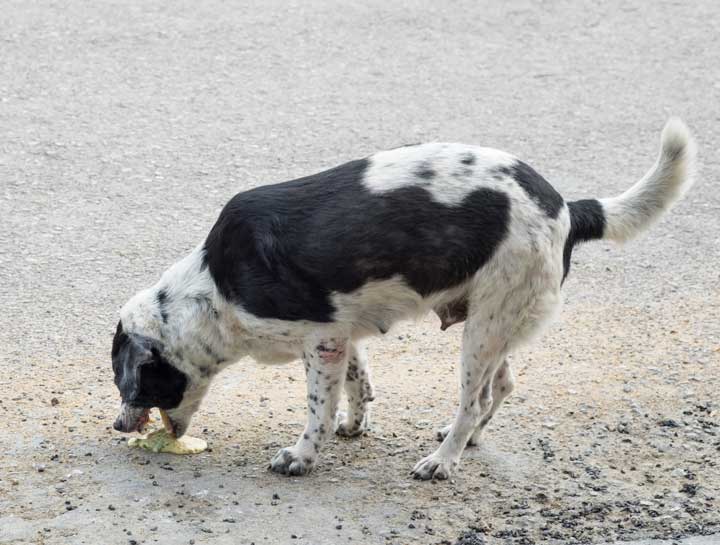5 Facts About Pancreatitis in Pets

Pancreatitis is a painful inflammation of the pancreas in dogs and cats. Unfortunately, many pet owners are unaware of this potentially devastating condition, and may unintentionally overlook risk factors and illness signs—increasing their pet’s chances of pancreatitis, and worsening their prognosis.
Because pancreatitis cases tend to spike around the holidays, Medina Veterinary Clinic is providing five essential facts that all pet owners should know about this aggressive, painful, and potentially fatal inflammatory condition.
#1: Pancreatitis is painful and can make your pet extremely sick
The pancreas has two main functions—producing two hormones, known as insulin and glucagon, to control blood glucose, and producing and delivering digestive enzymes to the small intestine, where they break down food into usable proteins, carbohydrates, and fats. When the pancreas is inflamed, digestive enzymes are prematurely activated inside, and they begin breaking down organ tissue. The enzymes and damaging cells (i.e., cytokines) enter the bloodstream, inflaming and injuring the body, and possibly leading to cardiac issues, bleeding disorders, and permanent organ damage.
#2: Pancreatitis in pets isn’t always caused by fatty foods
While unusual or high-fat foods are a common risk factor for dogs, the cause for most pancreatitis cases is unknown, which makes management and prevention a challenge. Fortunately, in addition to dietary indiscretion, other risk factors are known, including:
- Obesity — Overweight pets have an increased risk for pancreatitis.
- Breed — Pancreatitis is prevalent in miniature schnauzers, because of their high triglyceride levels and altered metabolism. Pancreatitis is also more common in certain other dog breeds.
- Age — Older pets are more commonly affected.
- Injury — Blunt trauma to the pancreas, located on your pet’s left side, can trigger inflammation.
- Concurrent disease — Inflammatory bowel disease, immune-mediated diseases, diabetes mellitus, or liver conditions can accompany pancreatitis.
- Chronic medication — Long-term use of certain drugs, including some anti-seizure medications, immunosuppressants, and steroids, can put pets at higher risk.
Although dogs have a strong dietary link, feline pancreatitis has no known connection to the fat content or variety in food. According to Cornell Feline Health Center, more than 95 percent of feline cases are idiopathic.
#3: Pancreatitis signs in pets are vague and nonspecific
Pancreatitis makes itself known, but is not obvious, and occurs as an acute (i.e., sudden) or chronic (i.e., long-term) condition. Signs are similar to many other conditions, making a veterinary examination and diagnostics necessary to confirm pancreatitis. Acute pancreatitis signs may include:
- Inappetence
- Persistent vomiting
- Diarrhea
- Lethargy
- Abdominal pain
Chronic pancreatitis may go unnoticed, because of its subtle signs, such as:
- Lethargy
- Decreased appetite
- Vomiting
- Weight loss, especially in cats
Pets may show abdominal pain or discomfort by repeatedly stretching in a bow position, standing with a hunched back, or a behavior change.
#4: Pancreatitis always requires veterinary attention and should not be treated at home
Without treatment, pancreatitis can progress rapidly, and lead to permanent organ damage or failure, so a wait-and-see approach is never recommended. Schedule an appointment at Medina Veterinary Clinic at the first illness signs, to ensure a positive outcome for your pet.
If your pet is diagnosed with pancreatitis, they may require hospitalization. Pancreatitis treatment, which is primarily supportive care, includes:
- Correcting dehydration and electrolyte imbalance
- Controlling pain
- Treating nausea, vomiting, and diarrhea
- Providing nutrition—once pain and nausea are controlled, pets should resume eating, or an appetite stimulant or feeding tube may be necessary, to avoid complications from prolonged inappetence.
Pets are typically hospitalized for several days until their condition improves. Mild to moderate cases may be managed with outpatient care (e.g., at-home medications, a low-fat diet) and often have a good outcome. Pets with severe pancreatitis or inflammation-related organ damage often have a poor prognosis, despite aggressive treatment.
#5: Pancreatitis in pets can’t always be prevented, but risks can be minimized

Unfortunately, pets who recover from pancreatitis will likely be affected again. Acute and chronic pancreatitis can ultimately lead to pancreatic scarring, which affects the pancreas’ ability to make and secrete glucose-regulating hormones and digestive enzymes. While predicting which pets may suffer from pancreatitis is impossible, some steps can reduce your pet’s chances, including:
- Feeding your pet a veterinary recommended diet, and low-fat treats
- Discouraging friends and family from feeding pets table scraps, and especially rich, fatty, or salty foods
- Exercising your pet regularly, to maintain a healthy body weight
- Avoiding abrupt diet changes
- Keeping trash cans emptied or inaccessible
- Maintaining preventive veterinary care
- Following veterinary recommendations for your pet’s concurrent health conditions
Pancreatitis in pets can be alarming, frustrating, and frightening. However, by recognizing this condition early, and seeking veterinary care at Medina Veterinary Clinic, you can improve your pet’s chances for a full recovery. If you are concerned that pancreatitis may be plaguing your pet, contact our team to schedule an appointment.
By Medina Veterinary Clinic | November 8th, 2021
